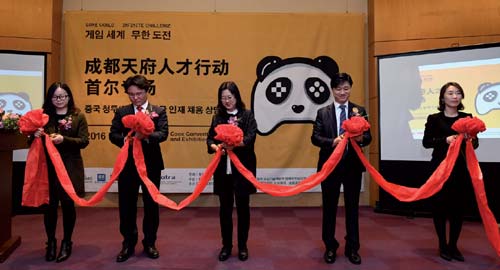High-tech zone developers recruit overseas talent
 |
|
Chengdu Hi-tech Industrial Development Zone representatives hold a talent recruitment event in Seoul, South Korea last month. PROVIDED TO CHINA DAILY |
The zone held the Chengdu Tianfu Talent Recruitment event in Seoul, South Korea last month. Six companies from the zone attracted more than 200 interviewees in the video game industry.
Most of the companies — Wind Play, Changhong Electric, Ubisoft Entertainment, Chengdu Skymoons Technology, Seasun, and Storm Game — are leading companies based in the zone’s Tianfu Software Park.
Tianfu Software Park, which has a completed area of more than 1.5 million square meters, is one of the largest software parks in China.
Yan Lin, human resources director of Skymoons, said his company participated in the recruitment activity to look for top-level talents in the industry.
“South Korea’s video game industry has been taking the lead worldwide, with a large number of professionals rich in experience,” he said, adding that the South Korean professionals particularly excelled at artistic design and research and development for new games.
Yan said his company prefers talents with an innovative spirit.
Han Han, recruitment manager of global game producer Ubisoft’s Chengdu studio, said his company is seeking professionals with experience in console games, art design and game programming.
“We interviewed nine high-quality candidates during the event and we are satisfied with their performance. This trip is well worthwhile,” he said.
Han and representatives from other companies also visited the Bushan G-Star annual trade show for the computer and video game industries during the trip to South Korea.
He said they communicated with the exhibitors at the show and gained a better understanding of the development and trends of South Korea’s video game industry.
They also established connections with professors at several South Korean universities, laying foundations for future cooperation, he said.
Gwon Beom, an interviewee, said he is willing to work in China and is particularly interested in working with Wind Play.
He said the video game industry in China has great development potential. “The scale of China’s video game market surpassed the United States and Japan last year, and is still increasing at a much faster speed than the global average,” he said.
He believes China’s video game industry could achieve greater progress with more overseas talents working in the country.
Lee Gwang-heon, another interviewee who had just come back from Canada, said many of his friends work at Chinese video game companies. He would also like to work at a Chinese company, but hadn’t yet had an opportunity to attend a Chinese recruitment fair.
Lee said he would prefer to work in China mainly because he would like to experience and learn more about Chinese culture.
“Video game designers are storytellers to some extent. By learning more about Chinese culture and customs, I will be able to tell more and better stories,” Lee said.
During the recruitment event, the Chengdu Hi-tech Zone also signed an agreement to establish a workstation at Adecco Korea, a human resources consulting company. The station will work as a channel to continually introduce South Korean talents to the zone.
The recruitment event in Seoul was the second overseas talent recruitment activity sponsored by the Chengdu Hi-tech Zone and organized by the Tianfu Software Park, following the first which was held in Silicon Valley in September.
Since 2007, the Chengdu Tianfu Talent Recruitment activity has been held in domestic cities such as Chengdu, Beijing, Shanghai, Guangzhou, Shenzhen and Dalian.
More than 100 social recruitment and campus recruitment fairs are held each year, attracting 100,000 people annually and recruiting more than 8,000 talents for companies in the zone. Most of the enterprises are located in the Tianfu Software Park.
Contact the writer at zhuanti@ chinadaily.com.cn















